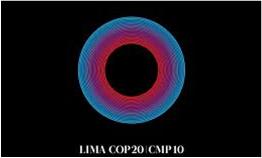COP20 in Lima
 Another round of climate change negotiations is taking place in Lima, Peru in December 2014 (COP 20/CMP 10 to be precise). Carbon pricing of emissions from international transport is unlikely to be discussed at any depth in Lima. The Conference is to prepare ground, including a draft text, for the international climate agreement to be agreed in Paris, in December 2015. Time is running out for this agreement and the difficult issue of international transport is unlikely to get much attention in Lima. In particular that both the ICAO and IMO, the specialized UN organizations for international aviation and maritime transport respectively,are working on reducing emissions from these sectors.
Another round of climate change negotiations is taking place in Lima, Peru in December 2014 (COP 20/CMP 10 to be precise). Carbon pricing of emissions from international transport is unlikely to be discussed at any depth in Lima. The Conference is to prepare ground, including a draft text, for the international climate agreement to be agreed in Paris, in December 2015. Time is running out for this agreement and the difficult issue of international transport is unlikely to get much attention in Lima. In particular that both the ICAO and IMO, the specialized UN organizations for international aviation and maritime transport respectively,are working on reducing emissions from these sectors.
The triennial Assembly of ICAO in 2013 failed to agree a global MBM for international aviation. Subsequently, under pressure from other countries, Europe has severely constrained its legislation for Emission Trading Scheme in aviation to only flights within European Economic Community.
The topic of MBM for international shipping was not discussed at the IMO at its environment sessions in 2014 at all, and neither during its previous session in 2013, when the topic had been postponed to “a future” session.
For the Lima Conference, 2014, updates from the IMO and ICAO work have been provided by their Secretariats. As usual, it is expected the representative of certain countries would express their, often opposing, understanding of the progress so far and potential way forward .... Details and links would be provided when they become available.
Unclear outlook
The outlook for the global MBM for international aviation and maritime transport continues to be unclear, even though both industries clearly prefer a global approach rather than a patchwork of regional legislations.
At the ICAO, the next Assembly in 2016 is to decide on a scheme capable of being implemented from 2020 (but what the decision would be, and whether the scheme would be effective, if decided, no one knows). At the IMO, it is not clear when the topic may progress any further, even though workable MBM proposals have already been tabled and assessed, including how to reconcile various positions and address disproportionate impacts on certain countries.
In these circumstances, it seems increasingly unlikely that the emissions from international transport would be effectively addressed under the new UNFCCC climate change regime to be agreed in 2015.
Unless political leadership is shown by the key countries, the fastest growing sources of greenhouse gases will not be addressed once again, and at the same time the opportunity to generate fair contributions to climate finance through these two large international sectors would be lost.
Positive implications of action
One argument against carbon pricing is that it mat have "negative potential trade implications" (as expressed in the statement by Cuba on behalf of a number of developing countries, see the UNFCCC webcast). However a global scheme that generate finance would have positive implications on the efficiency of international transport, and thus trade (providing some revenue is spent in the sector; obviously it would reduce the sector's emissions and address climate change in general).
Furthermore, such a scheme could effectively address the special circumstances of developing countries, without distorting competition, and without passing the financing burden from Annex I to developing countries, and thus it would make global scheme politically viable in the first place (for instance, such result could be be achieved through the rebate mechanism").
Regarding the need for finance in the sectors, one example is that both ICAO and IMO have already requested financing from the GEF for their respective global programmes. However, what they can receive is rather small, especially when compared with what could be raised from their global MBMs. This example also shows how absurd the current arrangement is becoming - the sectors with tax-exempt fuel are asking for money rather than pay for the damage they cause and for their own improvement programmes ... (especially true in aviation where it is the better off, i.e. richer, part of society that fly internationally and which would be effectively sponsored by everyone given the GEF's funding sources).